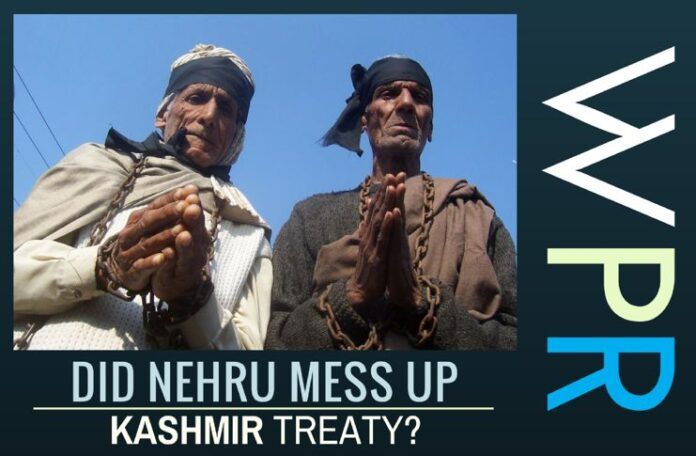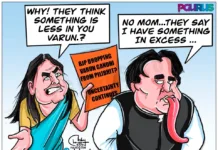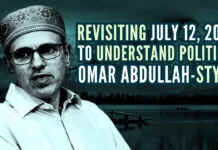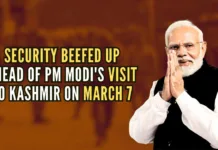
Another revolt has begun in our Jammu & Kashmir State. Saeed Ahmed Gilani and his flock of “separatists” are upset and very angry with the PDP-BJP government’s proposal to give an Identity Card to more than a lakh of “refugees” from Pak-Occupied Kashmir settled in the Indian Occupied Kashmir territory for nearly 70 years. All of them are mostly Hindus as were Inder Kumar Gujral and Manmohan Singh who, after the Hindu-Muslim Partition of 1947, made the wise decision to come to Delhi rather than to the Indian Kashmir, and went on to become India’s Prime Minister.
The terrified hordes who fled “Azad Kashmir” territory seized by Pakistani tribals and troops in the Indo-Pak war of 1947-48 who did not go to Amritsar, Delhi and elsewhere, chose to return to their native State of the J&K Maharajah. It has been a disastrous decision because they have got stuck there for seven decades, with only an Indian citizenship rights but nothing else. No secured livelihood for themselves, no right to hold immovable property, no government school scholarship or concessions for their children and no right to contest or vote in any kind of elections, be they of panchayats or the state assembly. Seventy years of destitution, really.
And the “separatist” Hurriyat with their cronies want them to stay that way. So do the Abdullah type of “National” (sic) Conference political arties with their stooges who have brought the J&K state of living on doles from the Central Government.
Why and what exactly is the cause of this misery of the one lakh-odd “refugees” of J&K? No, not because the Indian Constitution’s Article 370 — as is believed by our ignorant media. That destitution has been brought by Jawaharlal Nehru, our first Prime Minister, bowed to the Maharaja of J&K State when, at the time of signing his British-stipulated Instrument if Accession (IOA) to the Indian Dominion on 26th October 1946, he agreed to the Maharaja’s condition that the J&K State would be allowed to have a State Constitution of its own while the Maharaja “condescended” to allow the standard condition of letting the matters of Defence, External Relations and Communications, while decision on certain ancillary maters, including judicial courts and certain judicial provisions in J&K required consent of the State.
This did indeed lead to Article 370 of the India Constitution whereby certain legislations and provisions of the Constitution of India are not made applicable to J&K State without concurrence/consent of the J&K State government. But, as will be seen in the Appendix attached to this commentary, Article 370 did not, repeat did not, in any way affect the condition of the those “refugees” who left one part of British India to another part of the Dominion of India before the Constitution of India of 1950 made our country a sovereign democratic republic.
The misery of the “refugees” who went to J&K was brought about by Article 35A introduced by the Constitution (Application to Jammu & Kashmir) Order of May 1954. That Order, issued by the President of India, said as follows:
“35A. Saving of laws with respect to permanent residents and their rights.
“Notwithstanding anything contained in this Constitution, no existing law in force in the State of Jammu & Kashmir, and no law hereafter enacted by the Legislature of the State —
(a) defining the classes of persons who are, or shall be, permanent residents of the State of Jammu & Kashmir;
(b) conferring on such permanent residents any special rights and privileges or imposing upon other persons any restrictions as respects —
(i) employment under the State Government;
(ii) acquisition of immovable property in the State;
(iii) settlement in the State; or
(iv) right to scholarships and such other forms of aid as the State Government may provide
shall be void on the ground that it is inconsistent with or takes away or abridges any rights conferred on the other citizens of India by any provisions of this part.”
The above provisions of Article 35A were sanctified in the Jammu & Kashmir State Constitution adopted in November 1956 with five Sections therein dealing with the entity called ‘Permanent Residents’. Gradually came the laws that conferred extraordinary privileges on this entity, leaving the other residents of the State high and dry. Take the Constitutional aspects first. Description of Permanent Residents was incorporated in the Jammu & Kashmir State Constitution’s Section 6. It is quoted below, word to word.
6. Permanent residents —
(1) Every person who is, or is deemed to be, a citizen of India under the provisions of the Constitution of India shall be a permanent resident of the State, if on the fourteenth day of May 1954:
(a) he was a State Subject of Class I or the Class II; or (b) having lawfully acquired immovable property in the State, he has been ordinarily resident in the State for not less than ten years prior to the date.
(2) Any person who, before the fourteenth day of May, 1954, was a State Subject of Class I or Class II49 and who having migrated after the first day of March, 1947, to the territory now included in Pakistan returns to the State under a permit for resettlement in the State or for permanent return issued by or under the authority of any law made by the State Legislature shall on such return be a permanent resident of the State.
It should be noted here that the concept of “Permanent Residents” owes its origin to the creation of a ‘State Subject’ set out in the State Maharaja’s Notification of 20th April 1927 read with the Notification of 27th June 1932. Of considerable significance was that in the Order of 31st January 1927 of Maharaja Bahadur, clause II forbade outsiders to purchase immovable property in the State. That is the terrible legacy which has swamped not only the “refugees” of J&K, but all Indian citizens who wish to buy any kind of land in J&K.
Section 8 of the J&K State Constitution gives the State Legislature the right to define Permanent Residents while Section 9 permits the State Legislature to alter the definition of Permanent Residents, make provisions conferring any special rights or privileges on them and regulating or modifying such special rights and privileges. With the blessings of Article 35A, the Jammu & Kashmir State Legislature has enacted laws that actually confer certain rights and privileges on Permanent Residents while denying them to those who are not the State’s Permanent Residents.
Lastly, the monster of Article 35A is reflected in Section 140 of the J&K State Constitution. That Section permits only “Permanent Residents” to be registered as voters for the State Assembly. Thus, the fundamental right to universal adult franchise has been denied to the “refugees”. What kind of democracy is the Union of India permitting?
According to Arvind P. Datar, senior advocate, Chennai, for example:
- Only Permanent Residents are entitled to transfer any land in their name under Section 4 of the Land Alienation Act, 1995;
- In terms of Rule 17 of the Jammu & Kashmir Civil Services Rules, employment under the Jammu & Kashmir Government is permitted only to Permanent Residents but denied to other State residents persons even though they are citizens of India.
The present PDP-BJP coalition government must therefore be lauded for its proposal of giving an Identity Card to the “refugees” is to be lauded. One hopes it will be the first step towards awarding the recipients their long-denied right as a “Permanent Resident” of J&K. Yes, it’s a Himalayan war that lies ahead.
(Appendix listing the Text of Article is given below)
Text of Article 370 of the Constitution of India
‘Temporary provisions with respect to the State of Jammu and Kashmir’
(1) Notwithstanding anything in this Constitution —
- the provisions of Article 238 shall not apply in relation to the State of Jammu and Kashmir;
- the power of Parliament to make laws for the said State shall be limited to
(i) those matters in the Union List and the Concurrent List which, in consultation with the Government of the State are declared by the President to correspond to matters specified in the Instrument of Accession governing the accession of the State to the Dominion of India as the matters with respect to which the Dominion Legislature may make laws for that State; and
(ii) such other matters in the said Lists as, with the concurrence of the Government of the State, the President may by order specify.
Explanation: For the purposes of this article, the Government of the State means the person for the time being recognised by the President on the recommendation of the Legislative Assembly of the State as the Governor of Jammu & Kashmir State, acting on the advice of the Council of Ministers for the time being in office.
(c) the provisions of article 1 and of this article shall apply in relation to that State;
(d) such of the other provisions of this Constitution shall apply in relation to that State subject to such exceptions and modifications as the President may by order specify:
Provided that no such order which relates to the matters specified in the Instrument of Accession of the State referred to in paragraph (i) of sub-clause (b) shall be issued except in consultation with the Government of the State:
Provided further that no such order which relates to matters other than those referred in the last preceding proviso shall be issued except with the concurrence of that Government.
(2) If the concurrence of the Government of the State referred to in paragraph (ii) of sub-clause (b) of clause (1) or in the second proviso to sub-clause (d) of that clause be given before the Constituent Assembly for the purpose of framing the Constitution of the State is convened, it shall be placed before such Assembly for such decision as it may take thereon.
(3) Notwithstanding anything in the foregoing provisions of this article, the President may, by public notification, declare that this article shall cease to be operative or shall be operative only with such exceptions and modifications and from such date as he may specify: Provided that the recommendation of the Constituent Assembly of the State referred to in clause (2) shall be necessary before the President issues such a notification.
It is conspicuous that Article 370 continues as a “Temporary Article” in our Constitution till today!!!!
Note:
1. Text in Blue points to additional data on the topic.
2. The views expressed here are those of the author and do not necessarily represent or reflect the views of PGurus.
- To Editors’ Guild; May we also have our say… please? - July 17, 2019
- Farooq Sahab is either down with dementia or he is a congenital liar? - July 8, 2019
- Shah Bano, Muslims in gutter &Zakaria’s secularism - June 30, 2019











The author has taken only a very tiny section of the sufferers of The State of Jammu and Kashmir. He has not taken into consideration the loss of life in The Divided State. If only a humane and fair solution was found based on democratic principles so much of misery would not have been visited on these people. The author has only considered the aggressor’s, Invader’s ad occupier’s point of view. He has not taken into account of the majority of people’s pont of view. Give me on reason why they can’t lead their lives as they want and not as per wishes of the Brahmin Clout in New Delhi. The people in the state miserable because of ND not adhering to peaceful democratic principle but of force, aggression, occupation against the will of the people. This blood of millions of Kashmiris is on the hands of Nehru. He didn’t care how many millions died so long he had his wish.
These are not refugees from Pakistan occupied Jammu and Kashmir. They are from the then West Pakistan. Refugees from POJK enjoy all rights available under Jammu and Kashmir Constitution but the refugees from Pakistan don’t.
It would be not appropriate to term this part of Jammu and Kashmir as Indian-occupied or Indian-held Kashmir.